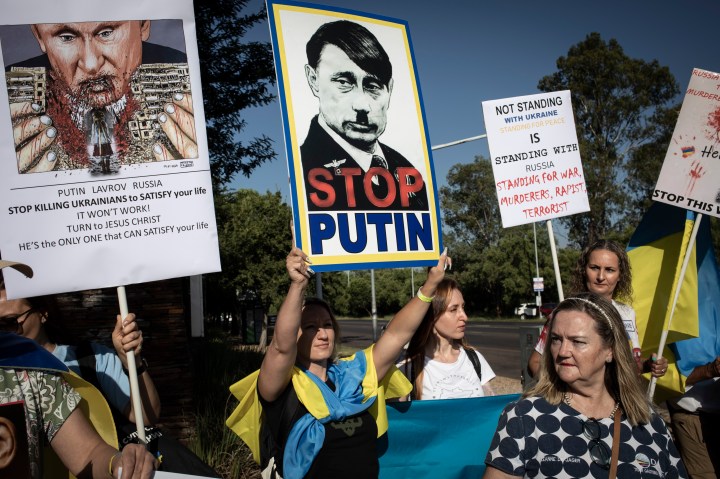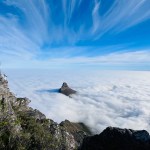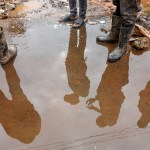Naval drills
South Africa’s naval exercise with Russia, China raises Western alarm

JOHANNESBURG, Feb 17 (Reuters) - South Africa was due to launch a joint naval exercise with Russia and China on Friday, a move it is calling routine but which has fuelled domestic criticism and fears the drills will endanger important relations with Western partners.
World powers are vying for influence in Africa amid deepening global tensions resulting from the war in Ukraine and an increasingly aggressive Chinese posture towards self-ruled Taiwan.
Some African nations are steadfastly refusing to take sides as they seek to benefit from the diplomatic tug-o-war. But analysts said hosting the 10-day Mosi II exercise, which coincides with the one-year anniversary of Moscow’s invasion of Ukraine on Feb. 24, is a risky strategy.
“These exercises are going to be a lightning rod,” said Steven Gruzd, of the South African Institute of International Affairs.
South Africa says it maintains a neutral stance on the Ukraine conflict and abstained from voting on a U.N. resolution last year condemning Russia.
Pointing to similar exercises it’s held with other international partners, including one with France in November, it has rejected criticism.
“South Africa, like any independent and sovereign state, has a right to conduct its foreign relations in line with its … national interests,” South Africa’s defence ministry said last month.
But six South Africa-based diplomats – all from NATO or EU countries – told Reuters they condemned the exercise.
“It’s not right, and we told them that we do not approve,” one said.
NOT WELCOME?
Russia’s own actions have stoked the controversy.
It has deployed a frigate armed with a new generation of hypersonic cruise missile called the Zircon.
President Vladimir Putin has called the weapon, which can travel at more than five times the speed of sound, “unstoppable”. And Russia’s TASS news agency reported this month that the frigate would perform a training launch during the exercise.
“I’m not sure South Africa really realises the potential backlash,” Gruzd said.
Russia’s defence ministry did not respond to a request for comment, and South Africa’s National Defence Force has denied the TASS report. But outrage among those opposed to Russia’s deployment in South African waters persists.
Last weekend, the vessel carrying the Zircon docked in Cape Town, emblazoned on its flanks with the letters Z and V – symbols Russia uses to promote the war in Ukraine.
“Cape Town will not be complicit in Russia’s evil war,” Mayor Geordin Hill-Lewis wrote on Twitter, declaring the vessel unwelcome in the city.
HISTORICAL TIES
South Africa’s governing African National Congress has long-standing ties to Moscow, which supported its struggle against a racist apartheid regime that many Western states considered a Cold War ally.
“Russia’s, and to a lesser degree China’s, posture as an anti-colonial ally still resonates in much of Africa, even if others may now view it as ancient history,” said Cobus van Staden of the China-Global South Project.
As Russia and China now seek to build new international coalitions, he said that history is coming to the fore in Africa where some nations are keen for alternatives to Western hegemony.
South Africa, for example, greatly values its place within the BRICS bloc alongside Russia, China, India and Brazil, and supports Beijing’s plans to expand membership and increase its clout.
There is a risk, however, of Pretoria’s foreign policy aims undermining its economic interests.
“Some companies have asked us if it is still safe to engage with South Africa for business, because they fear possible consequences,” one European ambassador told Reuters.
China is now Africa’s top bilateral trading partner, but the EU is by far the largest market for South African exports.
Two-way trade with the EU amounted to around $53 billion last year, according to South African data, compared to a little over $750 million with Russia.
Domestic critics of South Africa’s push to deepen ties with Russia and China say that economic reality alone should be enough to give the government serious pause.
“It is a slap in the face of our trading partners to be this clearly on the side of Russia on the anniversary of the invasion,” said Kobus Marais, who heads the opposition Democratic Alliance’s defence portfolio.
“We’re the useful idiots.”
By Carien du Plessis
(Reporting by Carien du Plessis; Editing by Nick Macfie)



















 Become an Insider
Become an Insider
So we’re screwing our economy with rolling blackouts, then applying the final push down the drain by giving the rest of the world the middle finger
South Africa is losing all credibility by playing with these 2 totalitarian regimes
How shameful! There will be a price to pay. Even India and Brazil are treading cautiously. But not South Africa. In typical fashion, the ANC seems drawn to worst-outcomes (the dumbest) decisions or actions. With trepidation, I await the consequences. And they’ll be there in the years to come. Be aware. Soon this comment page will be filled with Russian trolls and bots, as we’ve seen with other like articles.
Participating in naval exercises is not a demonstration of neutrality. Nor is Russia an anti-colonial power, it’s trying to re-colonize Ukraine. To cap it all, the likely purpose of the recent visit of the Russian ship Lady R to our main naval base was a “courtesy” visit, very likely to load artillery shells, to rain down on Ukraine, courtesy of Denel. Of course the government is within its right to choose sides, just as our trading partners would be within their rights to choose other suppliers.
ANC, you cannot feed South Africans with ideology